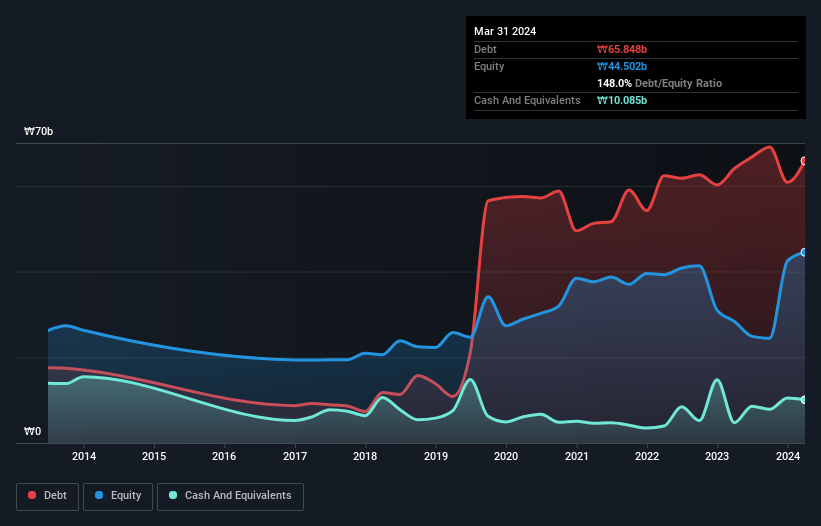
Howard Marks put it nicely when he said that, rather than worrying about share price volatility, 'The possibility of permanent loss is the risk I worry about... and every practical investor I know worries about.' When we think about how risky a company is, we always like to look at its use of debt, since debt overload can lead to ruin. As with many other companies Nuriplan Co., Ltd. (KOSDAQ:069140) makes use of debt. But the real question is whether this debt is making the company risky.
Why Does Debt Bring Risk?
Debt assists a business until the business has trouble paying it off, either with new capital or with free cash flow. Ultimately, if the company can't fulfill its legal obligations to repay debt, shareholders could walk away with nothing. While that is not too common, we often do see indebted companies permanently diluting shareholders because lenders force them to raise capital at a distressed price. Having said that, the most common situation is where a company manages its debt reasonably well - and to its own advantage. The first thing to do when considering how much debt a business uses is to look at its cash and debt together.
View our latest analysis for Nuriplan
What Is Nuriplan's Net Debt?
The chart below, which you can click on for greater detail, shows that Nuriplan had ₩65.8b in debt in March 2024; about the same as the year before. On the flip side, it has ₩10.1b in cash leading to net debt of about ₩55.8b.

How Healthy Is Nuriplan's Balance Sheet?
Zooming in on the latest balance sheet data, we can see that Nuriplan had liabilities of ₩83.0b due within 12 months and liabilities of ₩26.3b due beyond that. On the other hand, it had cash of ₩10.1b and ₩20.9b worth of receivables due within a year. So its liabilities outweigh the sum of its cash and (near-term) receivables by ₩78.4b.
This deficit casts a shadow over the ₩23.3b company, like a colossus towering over mere mortals. So we definitely think shareholders need to watch this one closely. After all, Nuriplan would likely require a major re-capitalisation if it had to pay its creditors today. The balance sheet is clearly the area to focus on when you are analysing debt. But it is Nuriplan's earnings that will influence how the balance sheet holds up in the future. So if you're keen to discover more about its earnings, it might be worth checking out this graph of its long term earnings trend.
Over 12 months, Nuriplan reported revenue of ₩129b, which is a gain of 2.8%, although it did not report any earnings before interest and tax. That rate of growth is a bit slow for our taste, but it takes all types to make a world.
Caveat Emptor
Over the last twelve months Nuriplan produced an earnings before interest and tax (EBIT) loss. Its EBIT loss was a whopping ₩20b. Combining this information with the significant liabilities we already touched on makes us very hesitant about this stock, to say the least. Of course, it may be able to improve its situation with a bit of luck and good execution. Nevertheless, we would not bet on it given that it vaporized ₩6.9b in cash over the last twelve months, and it doesn't have much by way of liquid assets. So we consider this a high risk stock and we wouldn't be at all surprised if the company asks shareholders for money before long. The balance sheet is clearly the area to focus on when you are analysing debt. However, not all investment risk resides within the balance sheet - far from it. We've identified 3 warning signs with Nuriplan (at least 2 which are a bit unpleasant) , and understanding them should be part of your investment process.
At the end of the day, it's often better to focus on companies that are free from net debt. You can access our special list of such companies (all with a track record of profit growth). It's free.
Valuation is complex, but we're here to simplify it.
Discover if Nuriplan might be undervalued or overvalued with our detailed analysis, featuring fair value estimates, potential risks, dividends, insider trades, and its financial condition.
Access Free AnalysisHave feedback on this article? Concerned about the content? Get in touch with us directly. Alternatively, email editorial-team (at) simplywallst.com.
This article by Simply Wall St is general in nature. We provide commentary based on historical data and analyst forecasts only using an unbiased methodology and our articles are not intended to be financial advice. It does not constitute a recommendation to buy or sell any stock, and does not take account of your objectives, or your financial situation. We aim to bring you long-term focused analysis driven by fundamental data. Note that our analysis may not factor in the latest price-sensitive company announcements or qualitative material. Simply Wall St has no position in any stocks mentioned.
About KOSDAQ:A069140
Nuriplan
Provides landscape lighting and landscape facility services in South Korea.
Adequate balance sheet low.


